 Photo Credit: mdany via Flickr. Photo Credit: mdany via Flickr. Creative Commons Attribution License 3.0 Over the past few years, I've noticed a theme with families who have a child with autism. Parents, usually moms, often tell me about their early experiences with friends, grand parents, members of their churches and communities. Over and over again I hear how these parents have been criticized for their parenting skills and choices regarding discipline. In fact, I have yet to meet a parent of a child on the spectrum who has not received this kind of criticism. The most common comment has been something along the lines of: That kid just needs a spanking. Excuse me?! I cannot emphasize enough how discouraging this has been to parents I've worked with, parents I have met in the community and at conferences. I realize that these comments often come from individuals who are ignorant of the fact that the child is on the spectrum, or, probably just as often, is ignorant of spectrum disorders all together. But isn't that the problem? It is so easy to be critical of any parent, especially one whose kid is melting down in the middle of Target. At a conference this weekend, a speaker stated that helping people is not about what YOU believe or what YOU think about their situation. It is about who THEY are and how THEY see and feel about their circumstances. Until we know these things about them and have developed a relationship with them, we have no right to judge or criticize their parenting skills. I have yet to meet a parent with a child who has not truly done everything they could, with the circumstances and resources available. I write to encourage all parents, but especially parents of children on the spectrum, to continue to do everything in your power to educate yourself, advocate for your child, and as much as is reasonable, seek every available resource and service that you can. The key here is "reasonable". Remember that being a caregiver is draining and taxing. Practicing good self-care and utilizing respite care will help. I realize this is easier said than done and we often work with parents to find practical solutions. Check out this post on self-care for parents of kids on the spectrum for more suggestions.
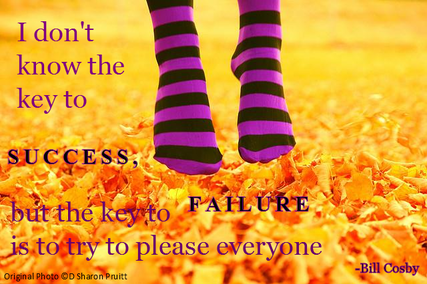 I am always amazed by the clients who begin the rewarding, difficult work of counseling and therapy. It is the beginning of saying something has to change, of saying, "I want something to be different." I am so grateful to be a part of the journey with clients who have this kind of courage. It means facing things about themselves that they don't like, things they are afraid of, and things that are hard or embarrassing to admit. What is really incredible, it is exactly those things that lead to the most real, lasting, and genuine change: confronting the very hard, uncomfortable parts of ourselves, with someone who accepts us for who we are, not who we could be. Isn't that amazing? If I am able to provide a safe place, to really accept my clients for who they are right now, then they are often able to climb those mountains that seemed insurmountable. Often one of those mountains is the desire to please. The key to success is different for everyone, but one thing is for sure trying to please everyone will certainly lead to failure.
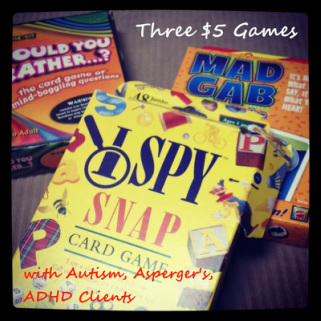 Whether you are a therapist, school counselor, or a parent, it can be difficult to connect to kids with Spectrum Disorders and ADHD. We call this “rapport building”. Often a child will come to my office with some amount of apprehension. Coming to our office involves a new environment and new people, which can add to the stress. Kids who are oppositional or defiant often feel like the “bad kid” and this will set a negative tone to our sessions. In an effort to build rapport, I frequently use these three card games, which cost about $5 each from Target or WalMart. I’m usually pretty flexible with “the rules” and do whatever I can to engage the child at their developmental and emotional level. 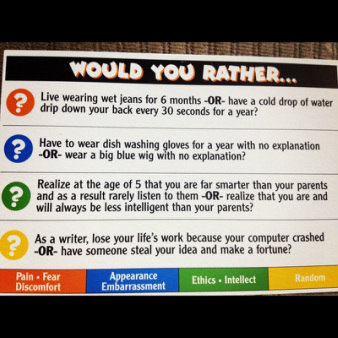 Would You Rather? ™ asks a series of questions such as, “Would you rather… Have to wear dishwashing gloves for a year with no explanation -OR- wear a big blue wig with no explanation?” Everyone playing has to make a choice (they can’t answer, “Neither!”) and they have to give a reason. It can be a silly reason or a logical reason, but they need to give a reason. This game works well with any child who is high functioning. I use it most with children with Asperger’s Disorder or Attention Deficit Hyperactivity Disorder (ADHD), as it encourages them to think through cause and effect, consequences, and desirability of actions and choices. I usually let the kid pick the card and the question and have everyone in the session answer, including myself and the parent.  Mad Gab™ Picto-Gabs™ “puts your eyes and ears to the test as you decipher funny word and picture puzzles”. Again this game can be played with an high functioning child, but I like it best for children who are oppositional and/or defiant. As I mentioned they often come in with a Don’t-Tell-Me-What-To-Do, This-Is-NOT-All-My-Fault attitude (which it usually isn’t “all” their fault anyways). This game is silly and engages a different area of the brain than the part of the brain responsible for the negative attitude. It helps shift us away from the “problem child” focus. (Each card has four puzzles, the answers are on the opposite side of each card. The answer to picture/word puzzle shown here is Amazing Grace)  I Spy™ SNAP™ is a card game version of the I Spy™ books. The official “rules” are similar to the card game War or Slap Jack. I usually modify the rules and use this game with lower functioning Autistic or Asperger’s clients. The cards feature different objects, but groups of the same objects. Here are several "matches" each with a duck somewhere on the card. Sometimes, I just hand the child one or two cards and point out what is on them. I have played where I hand a child the entire deck, one card at a time.
|
Nikki Schwartz,
|




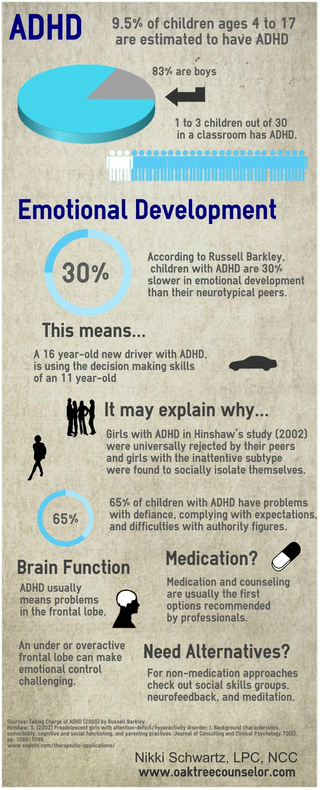

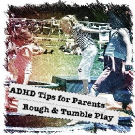
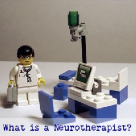


 RSS Feed
RSS Feed
